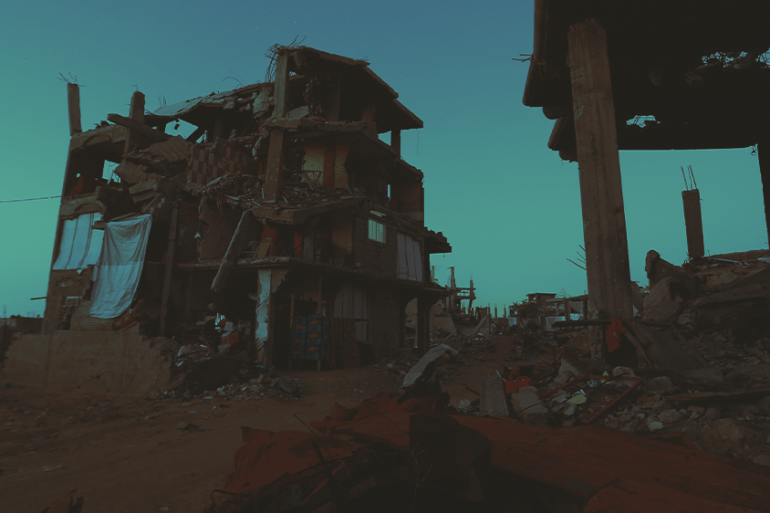Outrage in Gaza over suspension of reconstruction funds
Gaza residents say UNRWA decision to cut rebuilding funds is disastrous.

Gaza City – A wave of anger swept Gaza on Wednesday over UNRWA’s decision to cut funds for tens of thousands of displaced Palestinians, whose houses were destroyed or damaged during the 2014 war, promoting hundreds of war victims to demonstrate in front of the United Nations headquarters in Gaza.
“We expected to get money at the beginning of 2015, within a month or two – as promised – but now this decision is shocking,” said Hussein Abu Reida, 50, a displaced refugee who lives in a 30m caravan trailer with a family of 12 next to his destroyed house. “It was tragic to hear about the suspension of UNRWA’s fund, it was the same shock as the one we had when we found our house destroyed,” Abu Reida told Al Jazeera.
Keep reading
list of 4 itemsVideo shows Palestinian man forced to strip by Israeli soldiers
Israel’s war on Gaza updates: US vetoes Palestine bid for UN membership
Columbia University leaders face scrutiny over anti-Semitism on campus
On Tuesday, the UN agency said it was forced to suspend paying cash and rental subsidies to the displaced people in Gaza and that it needs $720m to resume the programme.
Officials say the agency has not received any of the $5bn pledged by international donors to pay for the rebuilding or repairing of 96,000 homes hit by Israel during last summer’s 51-day war.
On Wednesday, angry protesters attacked the UN headquarters in Gaza city by burning tyres, throwing rocks and attempting to break into the place. A number of protesters climbed the perimeter wall and entered the compound causing damage to the premises and property while screaming angry slogans condemning UNRWA’s decision.
|
|
Hundreds of people who have lost their homes during the war, and others who came in solidarity, insisted these protests will continue if the UN did not reconsider its decision.
Nehad Abdullah, 80, lives in a three storey house, in al-Zaytoun neighbourhood, which was seriously damaged during the war. Abdullah and her family received part of UNRWA’s financial aid which was $1,500.
According to Abdullah, it was barely enough to buy glass for the windows and two packs of cement to fix the cracked walls to protect them from the heavy rains of winter.
“I built this house with my pension as a former teacher and now it’s all gone, and after the war I had to borrow money to be able to live in my destroyed house,” said Abdullah with a desperate tone, adding that they don’t have the money to finish rebuilding the house.
Meanwhile, UN Special Coordinator for Middle East, Rober Serry, was outraged by the assault on the UNSCO compound and considered it a serious incident that took place in the context of increasing incitement against the UN in Gaza. In a statement from his office, Serry said that he was conducting an urgent review of operations in Gaza.
“We also continue to urge donors to support humanitarian operations and fulfil the commitments they have made in Cairo for the reconstruction of Gaza,” Serry said.
Five months have passed since the war ended, and the reconstruction process has yet to start. A familiar scene in most Gaza neighbourhoods is piled up building materials in front of some houses whose owners already got a part of their reconstruction money from UNRWA. Others are still waiting.
I built this house with my pension as a former teacher and now it's all gone, and after the war I had to borrow money to be able to live in my destroyed house.
UNRWA expressed concern that: “If it cannot continue to provide the rental subsidy, large numbers of displaced people may return to the collective centres, where almost 12,000 displaced Palestinians continue to seek shelter.”
But several protesters told Al Jazeera that their anger is directed at the UN because it has brokered the Gaza reconstruction plan. For many Palestinians, the plan, known as Serry’s plan, delays the reconstruction process and ties it to Israel’s security concerns.
As part of its siege on Gaza, Israel restricts cement and basic construction materials from reaching Gaza markets. According to the plan, those whose homes are damaged get cement after Israel approves the amounts needed.
Activist Adham Abu Selmeyyah expressed concern that if displaced people went back to live in the UNRWA schools, it would be tragic for the educational system. “The social and economic situation in the Gaza Strip is completely threatened by these decisions taken by UNRWA yesterday.”
Hamas says that UNRWA decision was a dangerous one and complicates the situation.
“Hamas considered this as a serious and mischievous decision for the residents of the Gaza Strip, especially as we’re going through difficult conditions on a humanitarian level,” Hamas official Bassem Naim told Al Jazeera, adding that this decision reflects a significant neglect of the international community towards the acute humanitarian crisis in Gaza.
“We’ve lost our work as farmers during the war and we’re not employees and now we have no income at all,” Abu Reida said.